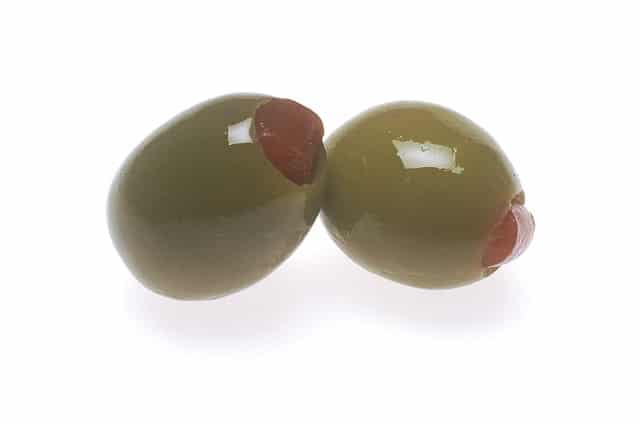Pimentos (pimientos) are known to add unique, sweet pepper flavors to our dishes.
Whether they are pureed in cheese dips, stuffed in olives, or dried into paprika, pimentos make excellent treats.
They are also very versatile—you can use them as an ingredient, a garnish, or as a spice.
But can you share some pimentos with your dog? Well, we’ll find out shortly but before then…
What Are Pimentos?
Pimento peppers are heart-shaped, red sweet peppers that measure between 3 and 4 inches long and 2 to 3 inches wide.
Unlike red bell peppers, pimentos are barely spicy; they are mild and sweet in flavor.
In fact, they score the lowest on the Scoville scale—between 100 and 500 Scoville heat units.
Even if you think that you have never tasted pimientos before, there are high chances that you have, especially if you have used the common spice, paprika.
Dried pimientos are often ground into paprika. Many chefs also prefer the mild and sweet flavor of paprika that is made with pimientos over those formulated with other spices like cayenne.
Can Dogs Eat Pimientos?
The short answer is: Yes, pimientos are non-toxic to dogs.
So, you can feed them to your dog without any problem, especially in moderation.
If anything, pimientos pack a punch when it comes to nutritional value for your Fido. They are loaded with vitamins A and C as well as potent antioxidants that promote a healthy immune system in dogs.
They are also rich in beta carotene, which may help prevent the growth of certain cancer cells.
Beta carotene can also help reduce cataracts and other age-related eyesight issues in dogs.
Low levels of Capsaicin
When it comes to adding peppers to dog food, one of the main concerns is capsaicin, a chemical compound in peppers.
The compound is mostly found in the seeds and ribs of the pepper though it can also erratically spread over the entire pod.
Capsaicin is the chemical that dictates the amount of heat that peppers have.
Peppers that have high concentrations of capsaicin are not safe for dogs and can cause stomach upsets.
In high concentrations, such peppers can even cause burns, mouth irritations, and a wide range of harmful health effects on dogs.
However, pimientos have very low levels of capsaicin. As such, they are considered to be one of the blandest peppers in the Capscium genus, making them ideal for dogs.
How Many Pimientos Can I Give My Dog?
Dogs are primarily carnivores, so they don’t need a lot of veggies in their diets.
High amounts of any type of vegetables, pimientos included, may upset your dog’s digestive system and even cause diarrhea, vomiting, and other GI issues.
As with any other new dog food, strive to feed pimientos in moderation and start with small quantities to see how your dog’s system reacts.
While some dogs will be fine with pimientos added to their diet, others may not be as tolerant.
Depending on your dog’s size and current diet, you can feed him 1-3 medium slices of pimientos a day.
If he is a small breed, half a pimiento will suffice.
Most importantly, be sure not to make these vegetables everyday food because your dog needs a variety in his meals to get all the necessary nutrients he needs.
Besides, remove all the seeds and inner core of the pimientos before feeding them to your dog as they might be difficult for your pup to digest.
The outer skin layer of pimiento may also be tough for your canine friend to chew or digest, especially when it is still raw.
So, before you share some pimientos with your four-legged friend, consider steaming them a bit to soften the skin.
Finally, never season pimientos with salt or garlic, and avoid giving your dog pimientos that have been cooked or mixed with onions as they can be toxic to your dog.
Can Dogs Eat Green Olives With Pimientos?

Fresh green olives are bitter in flavor and to make them more palatable, pimientos are often sliced and stuffed into them by hand or using olive-stuffing tools. This is what’s commonly referred to as pimiento-stuffed olives.
So, are pimiento-stuffed olives safe for your dog?
The short answer is: Yes, dogs can eat pimiento-stuffed olives provided that pimientos are the only items in the olives.
Green olives that are stuffed with other things like oils, onion, garlic, cheese, and other spices besides pimientos can be toxic to your dog.
Furthermore, while olive is not toxic to dogs, there are a few things you should keep in mind before sharing it with your canine companion.
- Feed in Moderation. Although olive is rich in healthy fats and proteins, allowing your dog to chow down too many can expose him to unnecessary calories. You should always ration the portions depending on your dog’s weight, age, and caloric requirements. Don’t be tempted to allow your dog to consume a whole can of pimiento-stuffed olives in one sitting.
- Ensure that the pimiento-stuffed olive doesn’t contain pits. Olive pits can cause obstruction and choking risks in dogs. They can also crack your dog’s teeth.
- Canned pimiento-stuffed olives may contain high amounts of sodium and artificial preservatives, which can be harmful to your dog. So, before sharing canned olives with your four-legged friend, ensure that you thoroughly rinse them.
- Never feed your canine companion olives that have been soaked in alcohol as they can be detrimental to your dog’s health.
- If you have to choose between green and black canned olives, go for black olives because they tend to have less sodium content.
Conclusion
Pimientos are human veggies that are safe for dogs to eat in moderation.
If you decide to share some pimiento or pimiento-stuffed olives with your four-legged friend, keep the quantity to a minimum for his body to remain nutritionally balanced.
What’s more, some dogs cannot tolerate any kind of pepper and may suffer stomach upsets, diarrhea, and vomiting after eating pimientos.
So, if you notice any abnormal symptoms after giving your dog pimientos, consult your vet for more professional advice.
As an Amazon Associate, we may receive a small commission from qualifying purchases but at no extra cost to you. Learn more. Amazon and the Amazon logo are trademarks of Amazon.com, Inc, or its affiliates.

